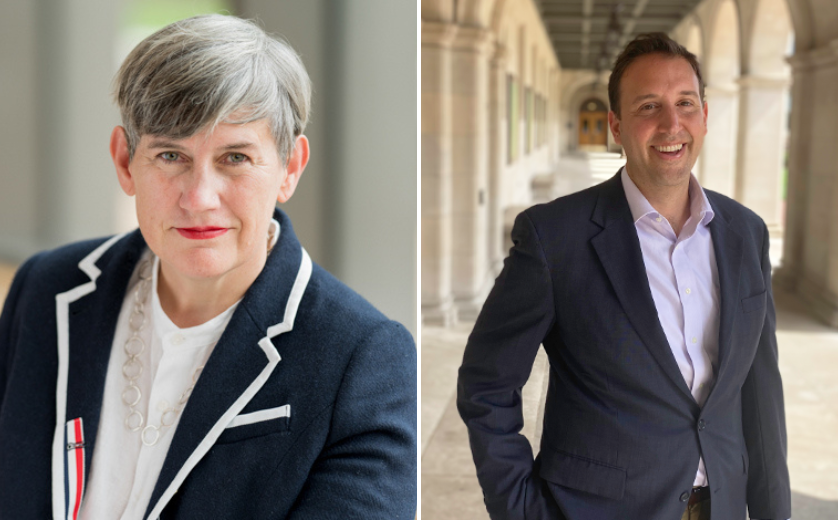Two Brown School faculty members have been awarded a combined $1.42 million in grants from the Ewing Marion Kauffman Foundation to support research focused on improving economic mobility and reducing wealth disparities.
Heather Cameron, the Michael B. Kaufman Professor of Practice in Social Entrepreneurship, received $920,000 to explore how Community Wealth Building (CWB) strategies can improve economic mobility in the Kansas City area. CWB models emphasize local, democratic ownership of community assets and have been used in several U.S. cities to foster inclusive economic growth.
Jason Jabbari, assistant professor, lead of the Center for Education Research, Practice, and Policy Partnerships (CERP³), and director of community engagement at the Center for Social Development, was awarded $500,000 to evaluate the impact of the Cristo Rey Network’s Corporate Work-Study Program on social mobility. This innovative high school program, which serves low-income students, combines college-preparatory academics with professional work experience.
Cameron’s project will examine how successful CWB models from other U.S. cities, such as worker cooperatives, employee-owned businesses, limited-equity housing, and community investment trusts, can be adapted to Kansas City’s unique economic and demographic conditions. The goal is to identify scalable approaches tailored to the city.
“Asset ownership through entrepreneurship has long been seen as a driver of economic mobility, offering crucial pathways for closing racial wealth gaps in marginalized communities,” Cameron said.
This is Cameron’s fourth project supported by the Kauffman Foundation. She will partner with the Aspen Institute Financial Security Program, the Democracy Collaborative, and Peter Boumgarden, the Koch Family Professor of Practice in Family Enterprise at Olin Business and the director of the Koch Family Center for Family Enterprise, as well as many Kansas City organizations like AltCap, Community Capital Fund, and Trust Neighborhoods.
“We look forward to working with Kansas City organizations and policymakers to explore how community wealth building strategies proven in other US cities can help build inclusive prosperity,” Cameron said.
Jabbari, along with Shaun Dougherty from Boston College, Lauren Russell from the University of Pennsylvania, and Fahvyon Jimenez from Jimenez Strategy & Analytics, will evaluate whether Cristo Rey’s unique education model influences key indicators of social mobility, including employment outcomes, earnings, credit health, and college graduation rates. The project will compare Cristo Rey graduates to peers who did not complete or attend the program. A special focus will be placed on Cristo Rey Kansas City school to better understand the inner workings of the unique school model.
“This will be one of the first longitudinal studies to measure the long-term social and economic impacts of career-connected learning within a college-prep framework,” Jabbari said. “We want to understand whether this hybrid model provides advantages over traditional academic or career and technical education pathways in promoting social mobility and racial equity, which could provide implications for scaling up these types of innovations in Missouri”
This project builds on Jabbari’s ongoing research examining how students develop professional skills and habits in both work- and school-based settings, and how those skills relate to social mobility.
These grants are part of a broader initiative by the Kansas City-based Kauffman Foundation to fund data-driven solutions aimed at closing the racial wealth gap and expanding equitable economic opportunity in the region.
“We’re proud to support this cohort of researchers working on the urgent and complex challenge of expanding equitable economic mobility,” said DeAngela Burns-Wallace, president and CEO of the Kauffman Foundation. “This funding is an exciting opportunity to expand understanding of the forces driving wealth gaps, which are persistent and expanding locally and nationally.”
Learn more about Cameron’s work at communitywealth.wustl.edu
